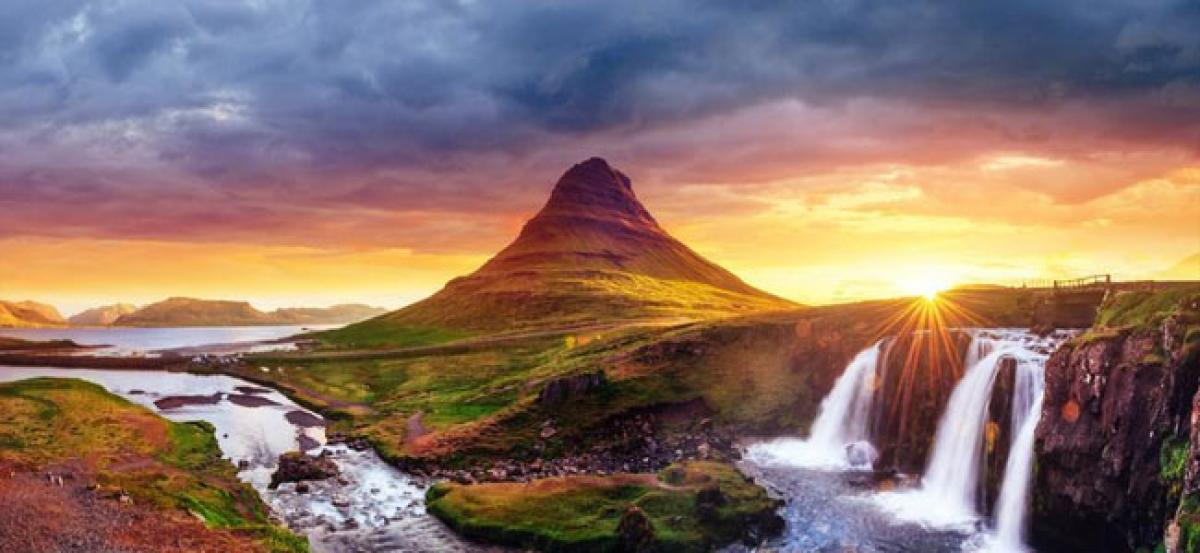Live
- Eminent cardiologist Dr Krishna Chaitanya performs rare surgery. Blood had clotted in brain
- Indian smartphone market poised for 6 pc growth in 2025 amid PLI push
- Foundation stone laid for Warangal Press Club boundary wall
- Healthy No-Bake Chocolate and Cherry Cheesecake
- Pistachio jam rock cookies: A crunchy delight with a nutty twist
- CM Cup: Three-day State-level judo competitions begin today
- Will hand over temple to TTD after completion: former MLA
- Why Shyam Benegal’s ‘Manthan’ is more than just a film
- Future food trends: What will be on the menu in 2025?
- Winter Workwear Made Easy: 5 Work Jackets to Keep You Warm, Stylish, and Professional
Just In

Summer, which is the peak tourist season in Iceland, has been a downer so far as record rains have lashed Reykjavik Locals are disappointed, but some tourists are making the most of it and enjoying the cool weather
Summer, which is the peak tourist season in Iceland, has been a downer so far as record rains have lashed Reykjavik. Locals are disappointed, but some tourists are making the most of it and enjoying the cool weather.Summers are special for Iceland as June marks the month of the midnight sun. The moderate temperatures lead many to head for camping holidays. Some of the most popular places to visit in Iceland are the Volcano Hekla, Reynisfjara Beach, the Blue Lagoon, Seljavallalaug Pool and the capital city of Reykjavik.
Summers in Reykjavik see people visit swimming pools, explore the city on foot, go for horseback rides and visit the Old Harbour. The prospect of direct flights from Delhi to Reykjavik have also generated a lot of interest in the country. But this year has been different, and all because of the rain.
Pop singer Helgi Bjornsson, who is well-known in his native Iceland for a 1980s hit titled I Do Like the Rain, recently appeared on national television while a deadpan reporter challenged him to defend the song’s premise. The people of Reykjavik do not like the rain anymore. This summer has been so gray and wet in the capital of Iceland that meteorologists have to look as far back as 1914 to find records for a worse May and June.
In other parts of Europe, especially Britain and Scandinavia, a heat wave is expected to continue well into July. The stark contrast is no coincidence. High pressure over western Europe alters the jet stream and pushes clouds and rain over the continent’s northern posts, causing foul weather in this North Atlantic island nation. “It’s the other side of the heat wave token,” said Iceland meteorologist Trausti Jonsson. “The people of Reykjavik are paying for the sunshine in England and southern Scandinavia.”
During June, the month of midnight sun and camping holidays in Iceland, sunshine touched Reykjavik for a total of 70 hours. The temperature reached 13.2 degrees Celsius on the warmest day, two degrees shy of Reykjavik’s average for the month. In May, it rained every single day.
Alex Moreno, a 17-year-old camper from Granada in Spain, said he found the brisk climate more pleasant than the boiling weather at home. “Just put on a jacket and it’s fine here,” he said. Things have been worse. In June 1914, when the slaying of Archduke Franz Ferdinand of Austria plunged the globe into World War I, Europe was under a hot spell and Reykjavik, in return, got biblical rainfall. Historian Gudjon Fridriksson said Reykjavik at the time was a town of about 15,000 people with an undeveloped sewage system and mostly dirt roads. “Getting from place to place meant crossing mud and a lot of puddles,” he said.
As for the remainder of 2018’s alleged summer, Fridriksson has an it-can-only-get-better attitude, a widespread expression of resilience and hope in this weather-beaten capital. “Besides,” the prolific historical writer said, “this is the perfect weather to finish my next book.”

News
Company
Entertainment
© 2022 Hyderabad Media House Limited/The Hans India. All rights reserved. Powered by hocalwire.com







